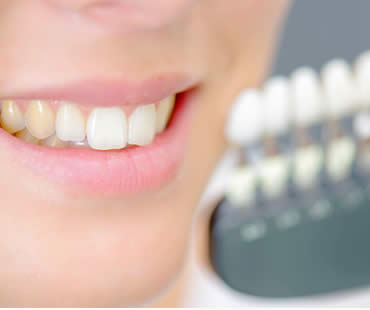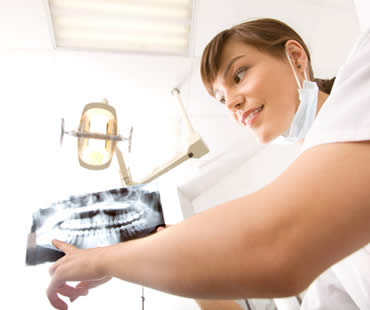
by Dr. Adkins | Mar 6, 2020 | Blog, Dental Topics 2, General Dentistry
If you have severely damaged, diseased or injured teeth, your dentist may recommend crown and bridge treatment. A crown is a dental restoration that fully covers a tooth and becomes the tooth’s new outer surface. A bridge is also a dental restoration that is anchored to natural teeth. However, a bridge replaces and fills the gap left by multiple missing teeth. Both crowns and bridges are made from a variety of materials and can be matched to the color of your natural teeth. Unlike removable dental devices like dentures, crowns and bridges are permanently affixed to existing teeth or implants allowing them to look and function similarly to natural teeth.
In addition to restored function and appearance, crowns and bridges offer a host of additional benefits including:
- Dental crowns protect and strengthen the natural tooth, helping you to avoid extraction.
- Crowns are the final step in root canal treatment, protecting the tooth from bacteria that could re-infect the treated tooth.
- Crowns and bridges restore missing teeth and support the remaining teeth.
- Your natural bite is restored and maintained with crown and bridge treatment.
- Placement of crowns and bridges improve your speech, smile and chewing function.
- Adjacent teeth are prevented from shifting and tilting with crown and bridge treatment.
- Crowns and bridges are long-lasting, predictable and durable.
- Placement of crowns and bridges is quick and can usually be completed in as little as two appointments.
- Alternatives to crown and bridgework, like dental implants, are usually more invasive requiring surgery and possibly bone grafting to place the implant.
Consult with your dentist to find out more about the advantages of crowns and bridges and how they can help to restore your healthy smile.
If you need a dentist in McDonough contact us today

by Dr. Adkins | Feb 28, 2020 | Blog, Dental Topics 2, Dentures
With an estimated 49 million adults in the United States wearing dentures, there are lots of lessons learned about wearing them. Virtually everyone will say that it took a little adjustment time before they were comfortable and confident with their new teeth. It can help to know what to expect with wearing dentures at first.
Your dentures may feel very strange the first day you get them. They can seem too big for your mouth, and as though your lips are out of place. These strange sensations will disappear with time. You may also notice more saliva than usual in your mouth. This is a natural response of your mouth as it grows accustomed to the appliance.
A liquid diet is recommended by many dentists for the first couple of days after getting dentures. Then you may begin eating soft foods, like cooked vegetables, eggs, and fish. Take small bites and chew slowly. Avoid biting into foods with your front teeth.
Mouth soreness from your dentures should go away after a few days. If it lasts longer than a week, call your dentist to ask if you should be seen. You may experience minor mouth sores for the first couple of weeks that you wear dentures. This is normal as you give your mouth time to adjust. If the sores are severe, call your dentist.
Dentists recommend that you remove your dentures for a minimum of eight hours each day to give your gums a rest. Most patients do this at night while sleeping. Your dentist will provide instructions about how to care for your dentures and where to store them when not wearing them. Be sure to follow the instructions for care to ensure that your dentures last as long as possible.
Schedule your appointment at our McDonough dental office

by Dr. Adkins | Feb 21, 2020 | Blog, Dental Topics 2, Oral Surgery
Obstructive sleep apnea is a condition created when a portion of the upper airway is blocked, causing breathing interruptions during sleep and low blood oxygen levels. As many as 20% of adults are affected by mild obstructive sleep apnea, while one in fifteen suffers from more severe apnea.
Symptoms of obstructive sleep apnea include snoring, extreme daytime drowsiness, restless sleep, high blood pressure, depression, problems with mental function, as well as a host of other mental and physical concerns. Left untreated, obstructive sleep apnea can lead to a long list of serious medical conditions, including hypertension, heart attack and stroke.
If you have been diagnosed with obstructive sleep apnea, your doctor may initially treat the condition with a CPAP device that you wear while sleeping. While a CPAP machine will reduce the obstruction to the airway, it is not a cure and will only be effective during use. Other non-surgical treatment recommendations may include the wearing of mouthguards to reposition the jaw, sleep position changes, or weight loss.
Tongue muscle advancement involves moving the bony attachment of the tongue muscles, and can be combined with palatal surgery to reduce excess tissues. This therapy may also include removing enlarged tonsils and nasal surgery. These treatments are most often used for milder cases of obstructive sleep apnea.
However, if these treatments do not work or for more severe cases of obstructive sleep apnea, oral surgery offers solutions to correct apnea. Maxillomandibular Advancement is a procedure that repositions the upper and lower jaw and chin to open the airway. This treatment is highly successful and offers the greatest chance of permanent correction in moderate to severe cases of obstructive sleep apnea.
For more information about how surgical therapies and treatments can be utilized to address your obstructive sleep apnea, consult with a qualified oral and maxillofacial surgeon.
Our dental office is located in McDonough

by Dr. Adkins | Feb 14, 2020 | Blog, Dental Information, Dental Topics 2
It’s hard to miss with advertisements and visits to the dentist that tartar is something you want to avoid for good oral health. But do you know what this substance is, how to keep from getting it, and what to do if tartar does develop?
What’s so bad about tartar?
Even if you brush and floss regularly, it’s impossible to get rid of all of the bacteria in your mouth. Bacteria and food residue combine to form plaque on your teeth. If left to thrive, plaque attacks your teeth and gums. It causes decay, gum inflammation, and will harden into tartar if not removed before it has the chance.
What does it do to my teeth and gums?
Tartar buildup makes it more difficult to brush and floss well, and tartar along your gums may lead to gum disease. Mild gum disease, or gingivitis, is often caused by plaque and tartar on your teeth. It can usually be reversed with careful dental hygiene. If left untreated, it will progress into periodontitis. This more serious gum disease can damage the bones and tissue that support your teeth, increasing your risk of tooth loss. It may also cause infections that contribute to heart disease and other health problems.
How can I control tartar?
Here are some ways to prevent tartar formation:
- Brush at least twice daily long enough to thoroughly clean every tooth and all of your gums. Consider using an electric toothbrush, which may be more effective for plaque removal.
- Use tartar-control fluoride toothpaste. It is formulated to help prevent tartar formation, and the fluoride can repair damage to your teeth that may have already begun.
- Floss every day to reach the areas that brushing cannot.
- Eat a healthy diet low in sugars and starches, and limit snacks between meals. Drink plenty of water to help rinse away plaque and bacteria.
- Don’t smoke because tobacco use has been shown to increase tartar buildup.
How do I get rid of it?
A professional cleaning is the only way to successfully remove tartar. See your dentist every six months for checkups and cleanings.
We look forward to seeing you in our McDonough dental office

by Dr. Adkins | Feb 7, 2020 | Blog, Dental Topics 2, Oral Surgery
If oral surgery is in your future, you might be worried about what’s to come. The way to relieve that worry is to talk to your oral surgeon. Your oral surgeon has the experience and knowledge necessary to guide you through whatever concerns or questions you may have. Here is a guide to some of those questions and answers:
How will I handle pain following surgery?
- In many cases, you will have been prescribed narcotic pain relievers. If you are taking narcotics, take them only as recommended and do not mix them with over-the-counter pain relievers or alcohol. Driving while on narcotics is dangerous and can have serious consequences for you personally and for others. If you weren’t prescribed any medication, use anti-inflammatory analgesics such as ibuprofen or naproxen sodium.
What will happen to my stitches in the days following surgery?
- Some stitches will be designed to dissolve over time and will not need to be removed. Others will not come out on their own and will need to be removed at a subsequent appointment. In many cases, losing a single stitch or two in the days following surgery isn’t serious; however, for bone-graft treatments, it is problematic and you should contact your surgeon immediately.
Can I eat normally after surgery?
- Immediately after surgery when you’re still experiencing any mouth or tongue numbness, don’t eat anything. You could mistake the soft tissues of your mouth for food and do serious damage to your mouth without realizing it. After your numbness subsides, consume soft foods of tepid temperatures for several days to allow for healing. Talk to your surgeon to learn when you can resume normal eating patterns as dictated by your particular surgery.
What other tips do you have?
- Stay hydrated and rest as much as possible to facilitate complete and quick healing. Call your surgeon if you have excessive bleeding or pain that doesn’t lessen with time. Be aware of signs of infection (swelling, redness, odorous or sour discharge) at the surgical site and seek professional care when needed.
If you need a dentist in McDonough contact us today

by Dr. Adkins | Jan 31, 2020 | Blog, Dental Information, Dental Topics 2
You’ve probably seen what coffee can do to a cup. Those brown stains that you see left on your cup are also sticking to your teeth. Coffee is especially hard on your teeth due to an ingredient called tannic acid, which gets into the grooves and pits of your tooth enamel and can stain it brown. Certainly the ideal way to stop the staining is to quit drinking the java, but that’s an unrealistic solution for many people. So what else can you do to save your pearly whites?
Drink smart
First, try and reduce the amount of coffee you drink. If you drink a lot of coffee, even cutting out one cup a day can lessen the dark stains on your teeth. Another suggestion is to drink your coffee in one or two sittings instead of sipping it all day long. Also, try lowering the temperature of your coffee. The hotter the coffee is, the more easily it can stain your teeth. Just letting it cool a couple of degrees can make a difference to your teeth.
Rinse
After every cup of coffee you drink, rinse your mouth with room-temperature water. This will remove some of the staining elements before they have a chance to set in. The water also helps neutralize acids in your mouth, which will lower the bacteria in your mouth that can lead to cavities.
Use a straw
If you like iced coffee or tea, drink it with a straw so that the dark beverage doesn’t directly contact your front lower and upper teeth. Using a straw reduces your teeth’s exposure to liquids that can stain.
Whiten your teeth
Ask your dentist about professional whitening methods, as well as products you can try at home. There are even some brands of whitening toothpaste made especially for coffee drinkers.
Practice good hygiene
Brush your teeth several times a day, especially after drinking coffee. Flossing daily also helps prevent stains, and is important if you add sugar or cream to your cup of joe. See your dentist twice a year for professional cleanings, which can do a better job of removing stains and restoring your smile.
Our dental office is located in McDonough








 (470) 665-5292
(470) 665-5292  E-Mail Us
E-Mail Us 
